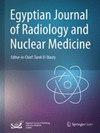The dilemma of mediastinal lymphadenopathy between invasive and non-invasive procedures: ROC analysis of T2WI and DWI-MRI advanced parameters correlated with PET-CT and biopsy
IF 0.5
Q4 RADIOLOGY, NUCLEAR MEDICINE & MEDICAL IMAGING
Egyptian Journal of Radiology and Nuclear Medicine
Pub Date : 2024-08-19
DOI:10.1186/s43055-024-01331-x
引用次数: 0
Abstract
The characterization of pathologically enlarged mediastinal lymph nodes is clinically essential for effective disease management and accurate prognosis. Malignancy (metastases and lymphoma) and granulomatous conditions (sarcoidosis and tuberculosis) are the most common causes. Magnetic resonance imaging (MRI) is a good modality to characterize the mediastinal pathologically enlarged lymph nodes based on the excellent soft tissue contrast. It can save high-risk patients from radiation exposure and hazards of intervention such as general anesthesia and biopsy. To estimate the accuracy of different advanced MRI quantitative parameters in the differentiation between benign and malignant mediastinal lymphadenopathy. This would involve the lesion-to-cord signal intensity ratio (SIR) in the T2-WI and diffusion weighted image (DWI), the lesion-to-chest wall muscle SIR in T2-WI and DWI, and the mean apparent diffusion coefficient (ADC) values. These values would be correlated with the prospective pathological data and the results of the positron emission tomography (PET-CT). Prospectively, the study was conducted during the period between June 2022 and September 2023 on 45 patients with indeterminate or suspicious mediastinal lymphadenopathy identified by CT. MRI examination, PET-CT, and biopsy were applied for all patients. The intra-class correlation coefficient ranged between 0.89 and 0.95. (A) The lesion-to-cord SIR in T2-WI in the malignant group (1.49 ± 0.30) was higher than that in the benign group (0.83 ± 0.24) with P < 0.001. The statistically calculated cutoff value (> 1.2) estimated 90% sensitivity, 100% specificity, with AUC = 0.989. (B) The lesion-to-chest wall muscle SIR in T2-WI in malignant nodes (3.13 ± 0.84) was significantly higher than that in the benign nodes (1.90 ± 0.80) with P < 0.001. The statistically calculated cutoff value (> 2.4) estimated 86.67% sensitivity, 86.67% specificity, with AUC = 0.88. (C) The lesion-to-cord signal SIR in b500-DWI in the malignant node (1.80 ± 0.54) was higher than that in the benign group (0.75 ± 0.29) with P < 0.001. The statistically calculated cutoff value (> 1.2) estimated 100% sensitivity and specificity with AUC = 1.00. (D) The lesion-to-chest wall SIR in b500-DWI in the malignant node (6.43 ± 1.28) was higher than that in the benign node (2.63 ± 0.94) with P < 0.001. The statistically calculated cutoff value (> 4.1) estimated 96.67% sensitivity, 100% specificity, with AUC = 0.997. € The mean ADC values in the malignant nodes (0.83 ± 0.20 × 10–3 mm2/s) were significantly lower than that in the benign nodes (1.85 ± 0.19 × 10−3 mm2/s) with P < 0.001. The statistically calculated cutoff value (≤ 1.2) estimated 100% sensitivity and specificity with AUC = 1.00. Biopsy remains the main diagnostic modality for the characterization of mediastinal lymphadenopathy despite its hazards and limitations. This study proved that MRI could be accepted as an alternative non-invasive imaging tool that can overcome the PET-CT limitations. The lesion signal-to-cord and to-muscle ratios in both T2-WI and DWI-MRI side by side with the mean ADC value showed high statistical accuracy.纵隔淋巴结病在侵入性和非侵入性手术之间的两难选择:T2WI和DWI-MRI高级参数与PET-CT和活组织检查相关性的ROC分析
病理纵隔淋巴结肿大的特征对于有效的疾病管理和准确的预后至关重要。恶性肿瘤(转移瘤和淋巴瘤)和肉芽肿病(肉样瘤病和结核病)是最常见的病因。磁共振成像(MRI)具有良好的软组织对比度,是确定纵隔病理性肿大淋巴结特征的良好方式。它能使高危患者免于暴露于辐射,并避免全身麻醉和活组织检查等干预措施带来的危害。评估不同的先进磁共振成像定量参数在区分良性和恶性纵隔淋巴结病方面的准确性。这包括 T2-WI 和弥散加权成像(DWI)中病灶与脐带的信号强度比(SIR)、T2-WI 和 DWI 中病灶与胸壁肌肉的信号强度比(SIR)以及平均表观弥散系数(ADC)值。这些值将与前瞻性病理数据和正电子发射计算机断层扫描(PET-CT)结果相关联。这项前瞻性研究于 2022 年 6 月至 2023 年 9 月期间进行,对象是 45 名经 CT 确定为纵隔淋巴结病的不确定或可疑患者。所有患者均接受了磁共振成像检查、PET-CT 和活组织检查。类内相关系数介于 0.89 和 0.95 之间。(A)恶性组 T2-WI 中病灶与脊柱的 SIR(1.49 ± 0.30)高于良性组(0.83 ± 0.24),P 1.2)估计灵敏度为 90%,特异性为 100%,AUC = 0.989。(B)恶性结节 T2-WI 中病灶到胸壁肌肉的 SIR(3.13 ± 0.84)明显高于良性结节(1.90 ± 0.80),P 2.4)估计敏感性为 86.67%,特异性为 86.67%,AUC = 0.88。(C)恶性结节中 b500-DWI 的病变-脐带信号 SIR(1.80 ± 0.54)高于良性组(0.75 ± 0.29),P 1.2)估计敏感性和特异性均为 100%,AUC = 1.00(D)恶性结节中 b500-DWI 的病变-胸壁信号 SIR(6.43 ± 1.恶性结节的平均 ADC 值(0.83 ± 0.20 × 10-3 mm2/s)明显低于良性结节(1.85 ± 0.19 × 10-3 mm2/s),P < 0.001。统计计算的临界值(≤ 1.2)估计敏感性和特异性均为 100%,AUC = 1.00。尽管活检有其危险性和局限性,但仍是确定纵隔淋巴结病特征的主要诊断方法。这项研究证明,核磁共振成像可作为一种替代性无创成像工具,克服 PET-CT 的局限性。T2-WI 和 DWI-MRI 中病变信号与脊髓和肌肉的比率与平均 ADC 值并列显示出很高的统计学准确性。
本文章由计算机程序翻译,如有差异,请以英文原文为准。
求助全文
约1分钟内获得全文
求助全文
来源期刊

Egyptian Journal of Radiology and Nuclear Medicine
Medicine-Radiology, Nuclear Medicine and Imaging
CiteScore
1.70
自引率
10.00%
发文量
233
审稿时长
27 weeks
 求助内容:
求助内容: 应助结果提醒方式:
应助结果提醒方式:


